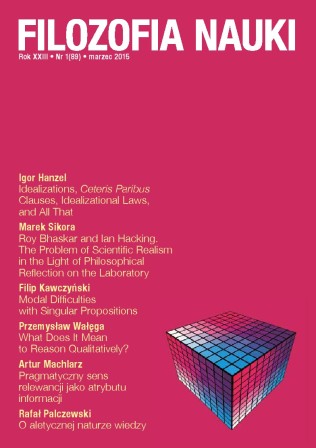O aletycznej naturze wiedzy
On the Alethic Nature of Knowledge
Author(s): Rafał PalczewskiSubject(s): Philosophy
Published by: Uniwersytet Warszawski - Wydział Filozofii i Socjologii, Instytut Filozofii
Keywords: knowledge; truth; JTB; factive verbs; presupposition; protagonist projection
Summary/Abstract: The paper is devoted to the alethic nature of knowledge, represented in the traditional epistemology by the truth condition (as a part of the so-called JTB definition of knowledge): one can only know what is true. The main motivation behind the article is to show that, despite the recent criticism, the truth condition is adequate and well-justified from the linguistic point of view. I discuss two general types of objections: one from the epistemological paradoxes (the Knower Paradox, the Knowability Paradox, and the Skeptic Paradox) and one from the would-be non-factive uses of “to know”. The “paradoxical” path leads some authors (Grobler, Woleński) to a simple negation or to a more subtle restriction or modification of the truth condition. The “ordinary-language” path leads other authors (Hazlett) to the thesis that the truth condition cannot be based on factivity of “to know”. I argue that both of these approaches are problematic, mainly because they are not well-supported. In addition, I try to show that “to know” is factive in Stalnaker’s sense: a sentence of the form “s knows that p” both entails and pragmatically presupposes the truth of “p”. I treat this as the major premise in the argument for the alethic nature of knowledge.
Journal: Filozofia Nauki
- Issue Year: 23/2015
- Issue No: 1 (89)
- Page Range: 99-145
- Page Count: 47

